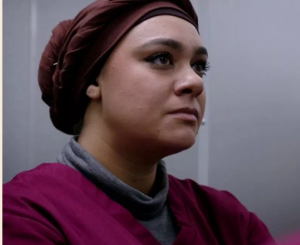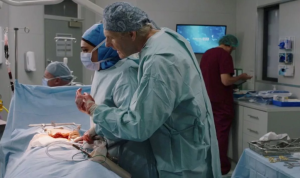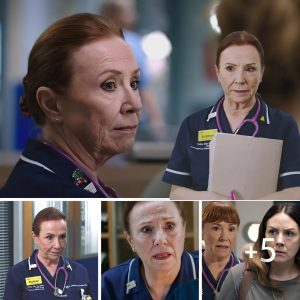Casualty is no stranger to dark, unsettling storylines, but this time the show has pushed into even more harrowing territory as actor Robert Bathurst reveals that his character, the powerful and manipulative Mr Russell Whitelaw, is about to face fresh “complications” amidst his ongoing abuse of power at Holby City Hospital. Viewers have already witnessed his disturbing behaviour escalate week after week, as he hides behind the title of Director of Clinical Services while weaponising his authority against those who work beneath him. Most notably, the drama intensified when Russell crossed an unforgivable line during surgery, using the close confines of the operating theatre to sexually intimidate nurse Rida Amaan. In chilling scenes, he moved in behind her as she tried to focus on her work, pressing himself against her back, brushing his arm over her shoulders, and leaning his head near hers in a manner that left her cornered, silenced, and powerless. It was a moment that sparked outrage among viewers, but also set in motion the next stage of a storyline that is both unflinching in its portrayal of abuse and deeply layered in its exploration of power, denial, and complicity. Despite her fear, Rida refused to remain voiceless, uncovering a group chat among female colleagues across the country in which women exchanged experiences of misconduct by senior consultants in hospitals nationwide. Against the advice of her friend Nicole, who urged caution, Rida made the fateful decision to release the group publicly, putting her career and safety at risk but shining a light on Russell’s behaviour in a way that could not easily be ignored.
Her boldness, however, only widened the cracks in her personal and professional life. Rida’s boyfriend, Sean, a registrar working alongside Russell, discovered her role in the leak and quickly turned into an unwilling accomplice in Russell’s games of control. His wounded pride after previous clashes with Rida led him to betray her, whispering secrets to Russell that put her in even greater danger. The dynamic shifted once again when Rida sought to corner Russell into admitting his misconduct, asking him for what she framed as a career chat but secretly aiming to record a confession. What followed was one of the most shocking moments in recent Casualty history: Russell not only refused but turned the meeting into another confrontation, attempting to snatch her phone when he realised what she was doing, and in the process ripping off her headscarf. For Rida, a Muslim woman whose headscarf is integral to her faith and identity, the act was both humiliating and violent, an exposure designed to strip away her dignity. Yet unbeknownst to Russell, the entire ordeal was witnessed by his own son-in-law, Flynn Byron, the clinical lead of the Emergency Department, whose complicated history with Russell adds an additional layer of danger. Speaking about these episodes, Robert Bathurst himself admitted that the tension lies not only in the overt abuse but also in the subtler dynamics of dependency: “It’s a big tension as to how far you support someone whose good word you’re dependent on for your professional survival. It’s something that is abusable by the boss; it’s also a very real dilemma for people working under the boss and dependent on their say so, as to whether you get on.”
As Bathurst explains, Russell embodies the chilling resilience of men who refuse to admit fault. “He’s used to getting his own way, he has that sort of alpha male quality – deny, deny, deny,” Bathurst says, noting that the character’s tactics are not unfamiliar to audiences who watch politics and public life. Like politicians cornered by scandal, Russell doubles down when accused, convincing himself that any complaint is either a misunderstanding or a fabrication, and dismissing allegations unless there is irrefutable evidence beyond someone’s word. This denial is at the heart of his defence, twisting truth and falsehood into shades of grey, insisting that nothing is black and white. His strategy is to muddy the waters, to make accountability impossible, and to keep himself untouchable. Yet Russell’s shield of denial is beginning to fracture, not only because of Rida’s courage but because Flynn has now seen his behaviour firsthand. Flynn and Russell hold dangerous secrets about one another. Viewers were introduced earlier this year to Flynn’s affair behind the back of his wife, Claire—Russell’s daughter—an indiscretion Russell discovered but never revealed after a car crash brought him into the hospital. That knowledge has become leverage, and Bathurst notes that Russell is more than willing to use it to protect his daughter, even if it means manipulating his son-in-law. “When he has the juice on someone, which he has with his son-in-law, in the protection of his daughter, he’s prepared to employ it,” Bathurst explains, underscoring that Russell thrives when holding others in his debt.
What makes this storyline even more unsettling is its refusal to offer easy moral lines. Bathurst reflec ts on the ambiguity of the narrative, pointing out that neither Russell nor Flynn can be neatly categorised as villains or heroes. “There are human frailties involved, the degree of venal behaviour is something that’s up for debate,” he says. “Whether the person should lose their job is up for debate, it’s not wholly clear. But what is true, you’re not dealing with very particular, good people, and people aren’t necessarily all good or bad, there is that measure of grey.” This complexity makes Russell particularly chilling because, while his behaviour is abusive and deeply damaging, he views himself as pragmatic, even justified in the control he exerts over others. To him, the hospital’s success and his long record of medical interventions justify the means he uses to achieve them. His manipulation is not always obvious but seeps into every corner of his relationships with colleagues, creating a suffocating environment where professional survival is dependent on silence, loyalty, and complicity. When cornered, Bathurst says, Russell responds robustly, dismissing allegations and recasting events in ways that blur the truth. His development, Bathurst hints, will intensify sharply in upcoming episodes, with audiences forced to confront the disquieting reality of his denial, his power, and the human complications that keep him firmly rooted in shades of grey rather than outright villainy.
ts on the ambiguity of the narrative, pointing out that neither Russell nor Flynn can be neatly categorised as villains or heroes. “There are human frailties involved, the degree of venal behaviour is something that’s up for debate,” he says. “Whether the person should lose their job is up for debate, it’s not wholly clear. But what is true, you’re not dealing with very particular, good people, and people aren’t necessarily all good or bad, there is that measure of grey.” This complexity makes Russell particularly chilling because, while his behaviour is abusive and deeply damaging, he views himself as pragmatic, even justified in the control he exerts over others. To him, the hospital’s success and his long record of medical interventions justify the means he uses to achieve them. His manipulation is not always obvious but seeps into every corner of his relationships with colleagues, creating a suffocating environment where professional survival is dependent on silence, loyalty, and complicity. When cornered, Bathurst says, Russell responds robustly, dismissing allegations and recasting events in ways that blur the truth. His development, Bathurst hints, will intensify sharply in upcoming episodes, with audiences forced to confront the disquieting reality of his denial, his power, and the human complications that keep him firmly rooted in shades of grey rather than outright villainy.





